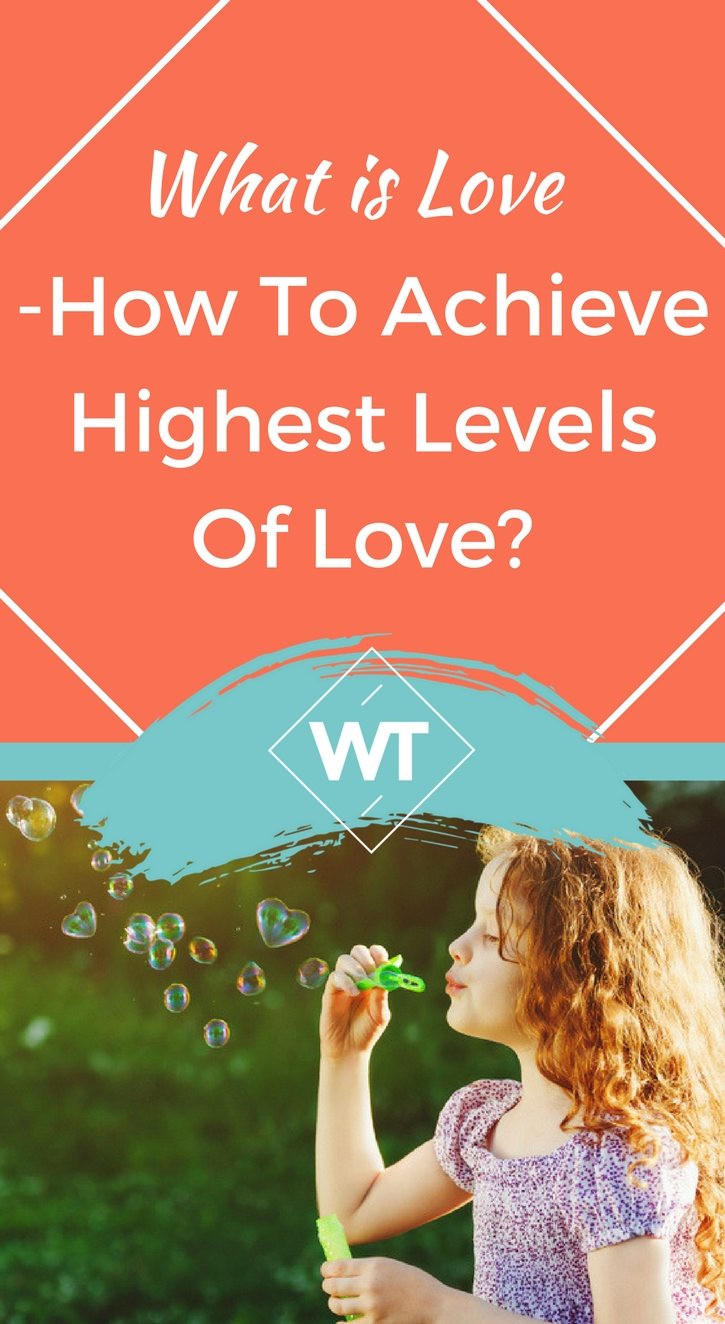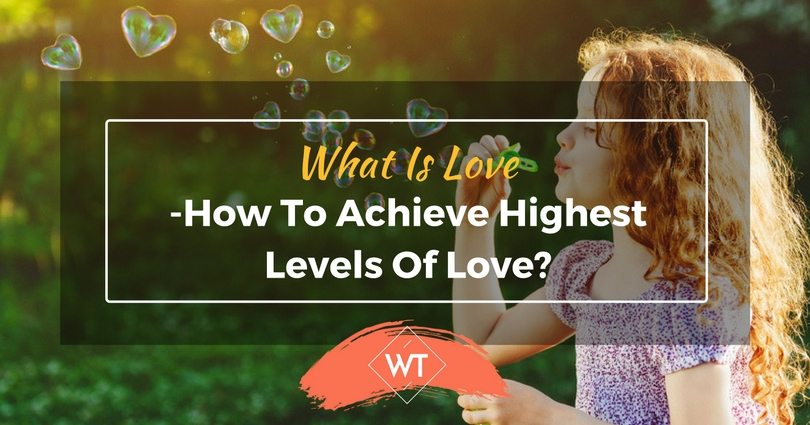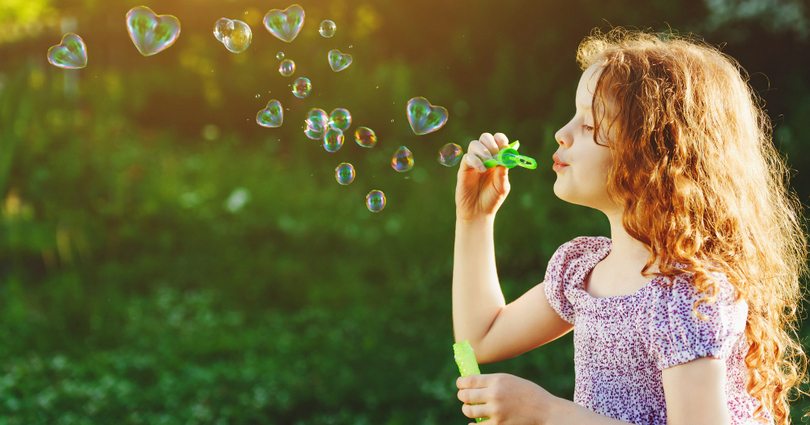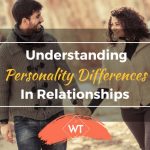What Is Love? How To Achieve Highest Levels Of Love?

True love is like ghosts, which everyone talks about and few have seen. ~ Francois de La Rochefoucauld (Tweet this)
Ahh… love! Such a trivial four-letter world. We see it and hear it everywhere since we were children, but can we even define it, or ever hope to understand it? What is love? If you’re like most people, you have your own theory of what it is, but is there a “right” answer to this eternal question? Let’s assume there is and try to figure it out.
What is love?
First of all, we all know there are very different types of love in the world. The way you love your romantic partner has nothing to do with the way you love your mother, which has nothing to do with the way you love your dog. We’re all like that and an important conclusion can be made from that fact: we are all capable of love in all of love’s variations, which makes us all amazing creatures.
Love is when the other person’s happiness is more important than your own. ~ Jackson Brown, Jr (Tweet this)
For the purpose of this article, we will separate the different ways we love into three distinct categories and try to explain each and every one of them:
- romantic love,
- non-romantic love,
- loving yourself.
Beyond answering the “what is love” question, we will also offer tips on how to achieve the highest levels of love we can.
The sad fact is that many people forget about the third kind of love—perhaps the most important one: self love. The way we feel about ourselves practically determines the way we feel about others and the world. Yet, on the web, while you will find plenty of theory about the chemical reactions in the brain when we fall in love, or about the way our neuro cells form the feeling of attachment. You’ll barely ever find anything about what conditions define the state of being in love with yourself.
So let’s dive in…
1. Romantic love
When you look at me, when you think of me, I am in paradise. ~ William Makepeace Thackeray (Tweet this)
You probably already know the importance of chemistry when it comes to emotion—especially the strongest emotions like fear and love. Our hormones go crazy when we find someone even somewhat attractive, but for this to grow into actual relationship, this is what must happen:
The physical part
This is what people usually refer to when they talk about “love at first sight.” The physical part of falling in love is actually a very small part of love. It is created by the sex hormones in our bodies, testosterone and estrogen, and it’s basically your brain screaming “let’s procreate!” Just because you’re physically attracted to someone doesn’t mean anything will happen between you two. Even if it does, who knows if it will last. In fact, recent research has shown that the stronger this sexual, purely-physical appeal is, the bigger the chance that you’re never able to be a couple. It’s just that the sex hormones are overtaking too large a portion of your conscious brain, which makes it impossible for the next stages of love to develop well. And speaking of next stages…
The falling in love
This stage is about the time when you’re first discovering that you like that person for who he/she is, not just how he/she looks like. Three hormones play a huge role in this process and they are adrenaline, dopamine, and serotonin.
It may seem odd that it is precisely adrenaline that controls a huge part of our behavior during this stage of love, because this is a hormone designed to respond to stress and give us the strength to survive in challenging situations. The fact that it has so much power when it comes to love proves that our brain accepts falling in love partly as danger, which is also one of the ways to explain the ever so popular fear of commitment (where adrenaline really takes over).
To give you an idea of what dopamine usually does in our body, I should let you know that it’s things like cocaine and sugar that increase its levels. Dopamine makes us energized, sometimes even hyper-active, focused and happy, and we barely need food or sleep. I’m sure whoever’s been in love can vividly remember feeling like they can do anything in the world, and especially if it is something for their loved one.
The one hormone that actually decreases when we are falling in love is serotonin. Recent research shows that the serotonin levels of people in love are as low as those of people with obsessive-compulsive disorder, which explains why in this stage, all we can think about is our crush.
Even after the falling in love stage, however, there’s still a big chance that things won’t work out for the long term between you and your partner. In order for that to happen, you have to go through the third and final stage of romantic love…
The attachment
Most people think that after those initial stages of romantic love have passed and the hormonal chaos of their bodies has calmed down, they are the ones who make the decisions—soberly and accurately. Of course, that’s not entirely true. The hormones that play a role in the attachment phase of romantic love are oxytocin and vasopressin, both extremely important so that couples can stay together long enough to have children.
Oxytocin is often referred to as the cuddle hormone. This is the hormone that creates the feeling of closeness and while it is released during orgasm to make the partners feel even more intimate, it is also released in other situations—during childbirth, for example.
Most of these hormones are a very logical reaction in the body so that you can mate. However, there is one hormone that confused scientists for a while and this is vasopressin. Vasopressin is the hormone that works with your kidneys to control thirst. So what does that have to do with romance?
To find the answer, scientists had to explore—believe it or not—rodents. In particular, the prairie voles. The prairie voles are known to form stable bonds with their partners and have more sex than is necessary than to be just for reproduction purposes. Yet, when the amount of vasopressin in their blood was suppressed, they lost interest in their partners and failed to protect them. So maybe vasopressin doesn’t just control your thirst for liquids . . . it controls your thirst for the one you love, as well.
Love recognizes no barriers. It jumps hurdles, leaps fences, penetrates walls to arrive at its destination full of hope. ~ Maya Angelou (Tweet this)
Can romantic love be created on purpose?
There are some helpless romantics out there who believe there’s more than just chemistry to real love, but a simple experiment could prove them wrong. Why try the experiment? Because if we can precisely answer the question of “what is love,” than we won’t need to count on just luck or random circumstances to obtain it. We should be able to recreate it anytime we want.
Professor Arthur Arun, creator of the popular “Falling in love in 34 minutes” experiment, manages to do just that. He figured that if any two strangers are put together, share deeply personal information about each other for a half-hour and then stare into each other’s eye for four full minutes, a certain level of closeness and love is practically inevitable.
The knowledge that we can almost ‘manufacture’ love makes you think. On the one hand, it seems too simple, like it devalues the strength of our genuine emotion. That’s why many people push against it and don’t want to believe this experiment.
On the other hand, this offers a solution to variety of problems. Just think of all the unhappy single people everywhere that can use this to find love. In fact, parts of this experiment have been recently used to bring Germans and Syrian refugees closer together so that the nation can live in peace
2. Non-Romantic love
There are different kinds of love, and I’d never experienced that kind of totally platonic love. All the love I’ve experienced has always been a kind of deal, and now, as I get older, I realize that there’s this other love out there. ~ Tracey Emin (Tweet this)
Non-romantic love is the kind of love many people find the “easiest.” At its core, it resembles the final stage of romantic love—the attachment. Because it lacks sex desires and adrenaline, this kind of closeness is indeed simpler. It doesn’t alert our mind to potential dangers, because when it comes to non-romantic love, we are usually very confident that it is a shared feeling.
This is the kind of love we usually feel for our families. Because they’ve been around us since the very beginning of our lives, you could even say we were born with this love. In fact, if we were deprived of this love, like orphans are, it very often affects our ability to feel that emotion throughout our lives. We’d be more afraid to trust others and create friendships, let alone a romantic relationship. In this sense, you can call the non-romantic love “basic love,” because it builds the foundations for the love you’ll feel in the future.
This is the moment to mention that the only way to move forward when you’re missing this “basic” love is to forgive. Forgiving is in itself a whole other kind of love, so forgiving others and forgiving yourself is essential for you to move on. What might make it easier is realizing that others will love you, throughout your life, even if you haven’t felt love in the family you were born in. And always remembering that you can love yourself—but we’ll talk about that later.
Non-romantic love is also called platonic love. “Platonic” is a term we now understand as a synonym of “non-sexual,” but it actually comes from Plato, who first described this kind of love. According to his studies, this is love towards someone who inspires the mind and the soul and directs one’s mind to spirituality, rather than pleasures of the body.
When described that way, it’s obvious that this kind of love is more than “basic.” It is the pure love of the spirit that makes a person grow. Here is where an interesting question comes up: do sexual love and non-sexual love mutually exclude each other? Or is there a way to have the best of both worlds—to have a partner you’re physically attracted to, but at the same time love unconditionally and support in everything (and you get the same in return).
Both scientists and some old, happy couples say it is possible. So if you haven’t found that type of love yet, keep looking. Or better yet, work on one of the top reasons people are not able to find true love: not loving yourself…
3. Loving yourself
Love yourself. Forgive yourself. Be true to yourself. How you treat yourself sets the standard for how others will treat you. ~ Steve Maraboli (Tweet this)
As I already mentioned, this is the most neglected type of love. It seems that we live in a world that calls this type of love “selfishness,” which is precisely the reason we see so many unhappy people today. Because what most don’t realize is that the way you see you is the way you see everyone and everything.
Think about it. If a person truly believes in his own abilities to handle whatever life brings, would he be fearful and resentful towards others? If a man knows in his heart that he is worthy of love, would he be worried that others might hurt him? Would he misinterpret jokes or get on the defensive over the smallest things? No, he wouldn’t. The right translation for loving yourself is not selfishness, it’s confidence—and here’s where we will dive in to explain what’s that all about.
“Confidence” is a popular word, but few understand it the same. For some, it’s the opposite of being shy. For others, it’s what you need before you decide to take a risk. When you look at confidence from the prism of love, it suddenly becomes quite clear.
Loving yourself is about appreciating who you are and bravely dreaming about who you want to be. It’s about realistically evaluating your abilities, but also knowing that you can improve them as soon as you decide to. It’s about forgiving yourself and others for doing you wrong and being grateful for everything good you created in your life: the great family you have (amazing!), the great body you manage to upkeep (good for you!), graduating first in your class (great!), landing that dream job (so awesome!), starting your business (that requires bravery to say the least!) or whatever else it might be that you’ve done and you’re proud of.
This kind of love is a strange combination between the romantic and the platonic love. It is difficult and a bit scary like the romantic love. But it is also natural and unconditional (in its healthy form) like the platonic love.
One thing I’d like to make very clear is that there is no such thing like “too much confidence.” Yes, I know what some of you may think: “What do you mean there’s no such thing? I can name a few people I know that are way too confident!” Here’s the deal: when someone is acting up, showing off and basically doing everything possible to get noticed and appreciated, do you think deep down inside he is confident, or do you think he is insecure?
Do you think he just loves himself so much that he can’t contain it and he needs to go around and shove it in people’s faces? Or do you think he doesn’t love himself at all and tries everything possible to get this love from someone else (and everyone else)?
I say this because as a coach I have worked with hundreds of people with low to no self-confidence. The weird part? Many of them didn’t even think that was their problem. They thought having confidence was being arrogant and rude and so they didn’t want to be that. In fact, they were so afraid of being that, they preferred to not love themselves.
It’s important that you understand how vital this love is not only for your prosperity in all areas of your life, but for your survival too.
Now, if you do understand it, another question comes up: how do you achieve it? Here are a some steps that will guide your way:
See yourself for who you truly are
It’s hard to feel desire when you don’t feel desirable. ~ Christine Feehan (Tweet this)
This may seem excessive to some people, but if you don’t know yourself, how are you supposed to love yourself? Because we are so connected to our bodies, and also because the lack of confidence is so often related to your body image, this exercise is really helpful and if you open your eyes for it, it will take you a long way.
Step #1
You need to be alone in a room with full height mirror. Now get completely naked and just look at yourself for a while. Yes, I know it sounds strange, but do it. Look at yourself for several minutes, turn in every possible direction, make funny poses and faces—whatever. Just get to know your body.
After a few minutes have passed, compliment a minimum of 5 features that you see in this mirror. Say it out loud like you’re talking to a third person. Say things like “Wow, your legs are so long! Nice!” or “Your smile is infectious!” or “Your curves are beautiful!” If you find it really difficult to come up with 5 genuine compliments, I have a trick for you to try—come up with 10! Yup, that’s how a person’s brain works. When you know you have to come up with 5, you’ll think of at least 3. But when you know you have to come up with 10, you’ll somehow think of 6.
In any case, the more the better! Repeat this exercise until you’re so comfortable with your naked body that you can’t wait to see it again! An awesome extra to loving yourself will be that somehow you’ll get the energy and motivation to fix even the parts of your body you don’t like—if there are any, of course.
- If you really don’t like your body, start doing this exercise in the dark, with a few candles. Slowly turn up the lighting until you are comfortable seeing yourself in daylight.
- Take the first step…
Now that you are connected with your body on a whole new level, it’s time to create the same deep connection with your mind. This exercise is rather conventional, but even if you have heard about it, few have tried it.
Take a pen and a notebook—preferably a journal that is only going to be used for similar tasks—and start by writing down everything you love about your life. It can be anything from past or present (and even the future, if you believe that something will happen). I want you to really open your mind and think about even the smallest, most basic things, like how comfortable your mattress is for example. Or the great weather in the place you live. Or your amazing friends. In fact, don’t just say “friends“, name them.
The more you write here the better. As you are writing, you will feel positivity and energy, and love filling you up and it will only get better and better. Keep writing until you really have absolutely nothing else to add. You have just finished the first stage of the exercise.
Step #2
The second stage of the exercise could look a bit more difficult if you don’t really love yourself, but the fact that you now have a list of things you adore about your life makes it a lot easier. It’s the part where you have to write down all qualities you love about your character and all the things you’re proud of. Again, you should write down as many of these as possible. If you feel challenged, look over the list of great things you like about your life.
Now think about this: how did you invite these things in your life? The universal law of attraction is already well-known, so you should be aware of the fact that you create your life (both consciously and subconsciously). Which means… Yes, you created all those awesome things you love about your life! You chose that perfect mattress and settled down in a town with awesome weather. You are brave, good with money, a good person, smart and capable of handling challenges in the best possible way.
You have attracted awesome people and you’ve gained their trust and love. You are the magical power in your own existence. As you list everything you love about yourself, allow yourself to feel the overpowering emotions of self-respect, gratitude, love and optimism for the future. Pat yourself on the back. You are awesome!
So far, so good. You might think that this exercise ends here, but it doesn’t. It’s time to make you even more awesome than before. It’s time for a quick reality check. Yes, we all have things about us we don’t like. That’s okay. A huge part of love is accepting the shortcomings of the people around you, and in this case, your own shortcomings.
The beautiful thing about your own shortcomings is that you can do something to change them, but not if you don’t know what they are.
Step #3
So now comes the time for a third list: a list of the qualities you don’t really like about yourself and think you should change. A few words about your list…
- First of all, some of us have louder inner critics than others. Be careful not to let yours take over. This is not about judging yourself or feeling bad. It’s about opening your mind to the possibility of becoming a better version of you.
- Second of all, it’s strongly recommended that you keep this list short. Why? The human brain often loses motivation to work on something when the work seems endless. This is the list of things you actually have to work on and so listing top 3 of what you want to change is absolutely enough. Start small; you’ll have the chance to work on the rest of your sweet little imperfections later on.
When I’m doing this exercise with my coaching clients, I often get asked the same question: How do I decide which top 3 of my “bad” features are? The answer is simple: don’t think too much, just feel it. What do you really hate about yourself? What are the things in you that make you believe that you can’t achieve this or that? Is it your weight? Education or lack thereof? Is it that you can’t speak up and are afraid of conflicts? Is it that you’re too fearful and never take risks? Is it that you lack will power and/or motivation to achieve your goals? Is it that you lack discipline? What are the things that are really stopping you; the things that, when changed, will make a noticeable difference in your life style? Got them? Good!
- And now for the last part. What are you going to do to change these? Think of methods you’d actually enjoy. For example, if you want to lose weight, don’t tell yourself that you’ll start a diet tomorrow and go to the gym 4 times a week. You know you won’t be able to keep that up for long—if you start it at all. Instead, make commitments like going to a healthy cooking class and learning to prepare meals you love that are good for you. Or going for a long walk or a bike ride (or swim, or something you love doing) anytime you can. If you want to learn how to speak up, don’t start fighting with the people around you—go to a debate class. To a public speaking class. To a coach. Commit yourself to things that will actually make you a better human being and let you grow while making you happy.
Are you ready to love everyone?
Not only do self-love and love of others go hand in hand but ultimately they are indistinguishable. ~ Scott Peck (Tweet this)
At the end of the day, whether we can answer “what is love” or whether we agree on it is irrelevant. Because, above all, love is the feeling that makes the world turn and we don’t need to dissect it. We should just feel it. Do you?
We’ve tried to asnwer the question of what is love, exactly; we’ve looked carefully into different aspects of the different kinds of love; but even more importantly, we’ve looked into ways to love stronger. To love stronger our romantic partners, our families, friends and ourselves. To love stronger because love leads to unity, to tolerance, to life.
Because it leads to growth: psychological, economical and otherwise. You now even know a way to fall in love with practically any stranger, but what’s even cooler is you know a way to make any stranger fall in love with you. You know how to love yourself and how to create platonic relationships that inspire your soul.
So what’s stopping you from loving everyone, now that you understand love a bit better? I hope, nothing.









Leave a Reply